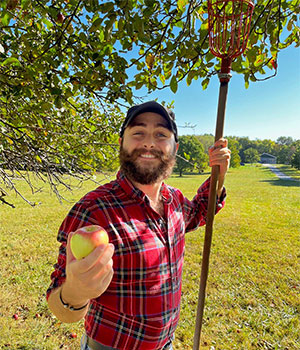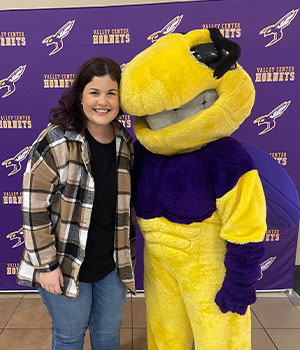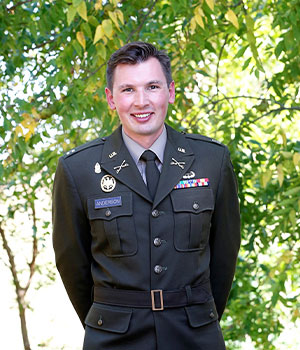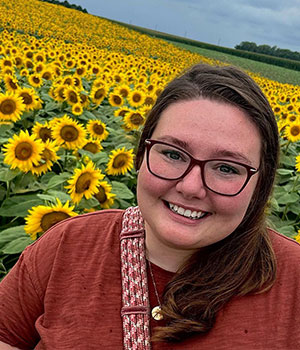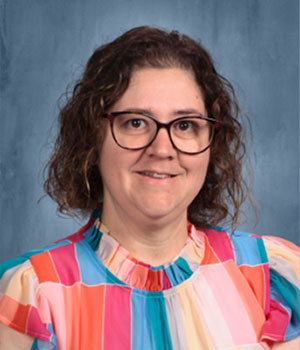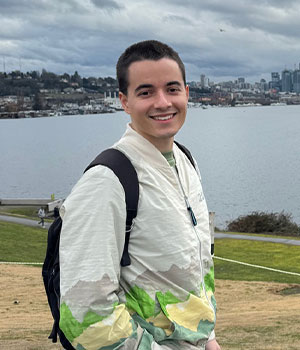Master of Arts in Teaching: Agricultural Education
Master of Arts in Teaching: Agricultural Education
This flexible, online master’s program is designed for current teachers or career changers and will prepare you for agricultural education teacher certification at the secondary level (grades 6-12).
The online Master of Arts in Teaching (MAT) is a flexible, practical and convenient pathway to teaching. With this program, you will benefit from:
- Affordable. All students pay in-state tuition regardless of residency. More than 70% of MAT students receive scholarships, such as K-State’s online scholarships and/or the Kansas Board of Regents’ Kansas Teacher Service Scholarship.
- Earn While You Learn. Through our Practitioner Track, Kansas students may obtain a restricted license and become full-time teachers while completing their degree requirements. Our License-Seeking Track allows students to continue their current (non-teaching) employment while they pursue their degree.
- Flexible and Convenient. MAT students work on their online courses as their schedules allow and may complete their program in as little as 12 months or at their own pace, with student teaching in local schools.
- Personalized Coaching. Every MAT student is assigned a GradCat — a master teacher who serves as a mentor, coach, and evaluator from the beginning to end of each course.
- Quality. K-State’s MAT program is ranked #20 among 313 online education programs evaluated by U.S. News & World Report. The program combines research-based preparation with practical, classroom-based experiences, ensuring graduates are well-prepared.
- Exceptional Learning Community. Your peers in the MAT program come from across the country and around the globe, bringing talent, insight, and shared purpose into every conversation.
- One Size Does Not Fit All. The MAT recognizes and values your unique strengths, views teaching as a practical and individualized activity, and prepares you for success across a variety of contexts.
- In-Demand Everywhere. K-State MAT graduates have the flexibility to launch teaching careers in their own communities — or beyond, with licensure that opens doors nationwide.
Agricultural education offers specialized courses that will explore content knowledge, providing enrichment and remediation to prepare you for your internship experience. You will focus on classroom, laboratory and student organization management preparing you for all roles in agricultural education.
The secondary agricultural education MAT consists of two, flexible tracks.
- License-seeking track: For students who pursue the MAT while continuing their current employment.
- Practitioner track: For students who pursue the MAT while teaching full time. Kansas teachers are required to hold a Restricted License.
Once you complete the program, you’ll be eligible to apply for an Initial Teaching License in the state of Kansas. Kansas Licensure also requires Praxis content test. The license will transfer to other states upon completion of any additional requirements for that state.
Feb. 25 - Don't miss our interactive webinar
PreK–6 Elementary + 6–12 Secondary MAT at 7PM
Spotlight on MAT Students
Each student featured here brings a unique background and perspective to their journey into teaching. Click on their profiles to learn more about their pathways, passions and experiences in the MAT program.
|
|
|
|
|
|
|
|
|
|
|
|
|
|
|
*Tuition rate is based on 2025-2026 rates, which are subject to change annually. Your hours and costs will differ depending on your transfer hours, course choices and academic progress. For a full breakdown of all tuition and fees, please visit K-State's Online Tuition and Fees website.
Dr. Jonathan Ulmer specializes in agricultural education. He teaches a variety of classes, preparing students for careers as high school agriculture teachers. Prior to coming to K-State, Dr. Ulmer served on the faculty at Texas Tech University and the University of Missouri. Growing up in Nebraska, he earned his bachelor’s degree in agricultural education at the University of Nebraska and taught agriscience at Medicine Valley High School in Curtis, Nebraska. He earned his master’s in agricultural education at Oklahoma State University and his doctorate in agricultural education at the University of Missouri-Columbia.
